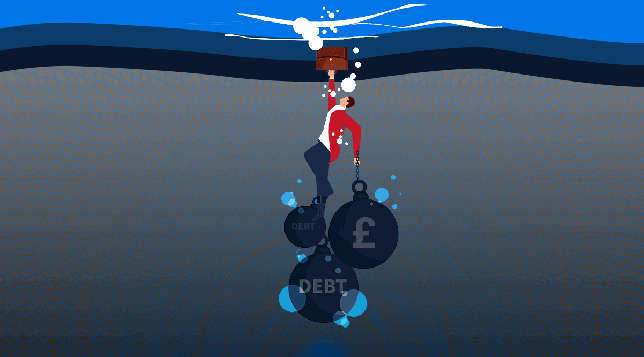Debt is a truly terrifying thing.
It’s tempting to bury your head in the sand and pretend a money crisis isn’t happening. But we all know that when it comes to debt, the longer you try to ignore it, the more it spirals.
It’s essential to take that scary first step: having an honest look at your finances and getting real about where you might be going wrong.
But how do you do that? And then what?
Money mindset coach Sarah McCalden advises looking back and really analysing the patterns we hold around our personal finances.
Then, it’s time to let go of the shame.
‘There are myriad reasons why we go into debt,’ she tells Metro.co.uk. ‘If you want to be debt-free, then you need to be honest, with a capital H. Stop ignoring it and get to tackling it.
‘How do you do that? Start by forgiving yourself.
‘When you took on your debt, you most probably took it on because it felt right and necessary at the time. Don’t blame yourself.’
Letting go of that self-blame will save you so much time and energy. Once you stop beating yourself up for past decisions, you’re free to start making better choices, and to dig yourself out of a debt hole.
This will also make the next step a little less awful.
‘Pull out your credit card and loan statements and take out a pen and a piece of paper,’ Sarah advises. ‘This may be painful – but don’t run away from doing this – this is a powerful and lifechanging exercise.
‘Write down your reasons for purchasing those things on credit cards and taking out those loans.
‘As you think about for a moment what the reasons were that you purchased those items on credit, complete this sentence:
‘The reason I used my credit card to pay for that was________.
‘The reason I took out that loan was____________.
‘Then, next to this statement, write down the emotions that were influencing those reasons, and what you were trying to achieve by using this debt. You have to be ruthlessly honest here, even if this means admitting to some things that you’re not proud of.
‘Carrying debt without this kind of personal honesty keeps you out of integrity with yourself, which allows guilt, shame and other painful emotions to fester.
‘By being honest, you are keeping in integrity with yourself, which is a crucial first step to setting yourself up for debt payoff success.
‘We all know we are our own harshest critic. We give ourselves the hardest time. Stop that here and now. Forgive yourself for these things and let it go and place your focus on taking action to move yourself out of debt.’
When you do this exercise, you’re likely to notice certain patterns or emotional reasons behind your debt habit.
Perhaps you feel social pressure to keep up with the lifestyles of others. Maybe you’re an emotional spender, and buy things as a way to cope with tough feelings. You might be driven by impulse, taking out loans and spending cash you don’t have on a whim, then feeling racked with guilt moments later.
It’s vital to look into these emotions, but also how your debt is affecting you negatively today.
Get real about it. Is the state of your money keeping you up at night? Are you so busy worrying about finances that you’re not present for conversations with loved ones? Do you keep making bad decisions because you’re in a state of panic?
Recognise the real impact your debt habit is having. Write it down and keep this knowledge handy the next time you’re tempted to spend.
Recognise, too, that getting into debt isn’t fixing the problems you’re hoping it will in the moment.
‘You are only hurting yourself and your family by continuing this behaviour,’ Sarah points out. ‘Don’t self medicate with debt. Only use debt, if you have to, as a tool.’
It’s only once you do this step that you can start the practical stages of getting out of debt: getting support, making a debt management plan, and committing to getting into the clear, one spending and saving decision at a time.
Sarah McCalden is a money mindset mentor, Canfield Success Principles Trainer and certified business coach. She runs a 30-day money challenge to help people completely overhaul their relationship with personal finance.
If you want more tips and tricks on saving money, as well as chat about cash and alerts on deals and discounts, join our Facebook Group, Money Pot.
Source: Read Full Article


